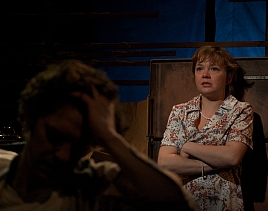Curse Of The Starving Class At New Leaf: Melodrama At Its Best
By Julienne Bilker in Arts & Entertainment on May 14, 2010 6:40PM

photo of Layne Manzer and Victoria Gilbert by Tom McGrath
A Sam Shepard play done poorly is angsty and strange.
A Sam Shepard play done well is riveting and explosive.
We may be one year older and wiser, but we stand by that statement. Although New Leaf Theatre's Curse Of The Starving Class is more of a slow-burn than an explosion, its charged performances and palpable pathos are riveting. If you like that sort of thing.
Why the qualifier? Well, as our headline indicates, Curse is a melodramatic play. Set in a literally crumbling house (a metaphor for the family that resides in it), it has many themes - but we feel they can be boiled down to one: failure. Patriarch Weston is an abusive alcoholic with an eye for bad investments. Matriarch Ella is a perennial victim with pipe dreams of starting a new life in Europe. Older son Wesley tries to hold the house together, but shrivels in the presence of his grizzly father. Daughter Emma seems to have the best chance of escaping, but her family literally pisses on her efforts at normalcy. Everyone has moments in which they can see themselves reborn into better people with better lives, but despite Ella's protestations that they "don't belong to the starving class," they are all in too deep. We didn't feel a single second of hope for any of them - which we found both poetic and problematic.
The poetic part comes from watching these people exert their most sincere efforts - which, granted, vary in terms of actual sincerity - to be good. Ella (Victoria Gilbert) talks a big game about selling the house, being a good mother and taking care of her family, but she is clearly both terrified and lazy - two qualities that Gilbert expertly plays simultaneously while exuding blatantly false self-confidence. When Emma (Alyse Kittner, who deftly navigates the line between playing a teenager and playing at being a teenager) runs away after a fight, Ella yells at Wesley to intervene - Ella cares, but not enough to get up herself. Her inertia is maddening to both the audience and her son. Wesley (Layne Manzer) tries to compensate for his parents' failings by tending to the house and attempting to be a man - but without a job, he can't put groceries in the empty fridge. And besides, he all but shrinks into a corner when his father appears. It's pathetic, but Manzer is likeable in a beaten-down-puppy sort of way, particularly during his failed transformation in the play's final moments.
Last but not least: Weston (John Gray). We are introduced to Weston's reputation far before his first entrance, and he lives up to it. Gruff, frightening, volatile, drunk and large enough to be dangerous, we could practically smell the alcohol sweating out his pores. In a past drunken stupor, he blew a load of cash on a plot of desert nothingness he'd never seen - and now (unbeknownst to his wife, who is trying to sell their house from underneath him), he's agreed to sell his family's home for a pitiful amount of cash. The fact that he barely remembers this transaction upon finally waking from his blackout is reason enough for him to pretend it never happened. Because he's been reborn, he says, he doesn't have to pay for his past anymore. It's only a matter of time before his mistakes catch up with him. And they do. Gray's performance is absolutely phenomenal - despite the fact that he's been the catalyst for most of his family's logistical problems, we found ourselves feeling the sorriest for him.
Now about that "problematic" part. Curse pretty much starts and ends in the same place. We realize this is the point. Director Kyra Lewandowski has given this play its due, but when the ending is so obvious from the beginning, it's hard to stay alert for two and a half hours. Nick Keenan's sound design was beautiful, but, like the show itself, it felt like a slow burn. We interpreted the music's jarring cuts out of scene transitions (rather than fades) as attempts to wake us up a bit. Ditto for Jared B. Moore's monologue-punctuating lighting shifts. Michelle Lilly O'Brien has created a fantastic set in a very small space, which kept our eyes engaged throughout the show. But all of this design support for some great performances still didn't completely add up for us. We were puzzled, until we admitted the truth to ourselves: we don't like this script very much. But you might. And this production really is excellent.
Curse of the Starving Class, through May 22. New Leaf Theatre in residence at the Lincoln Park Cultural Center, 2045 N. Lincoln Park West. Tickets $18 (industry $10, students/seniors $12), 773-516-3546.